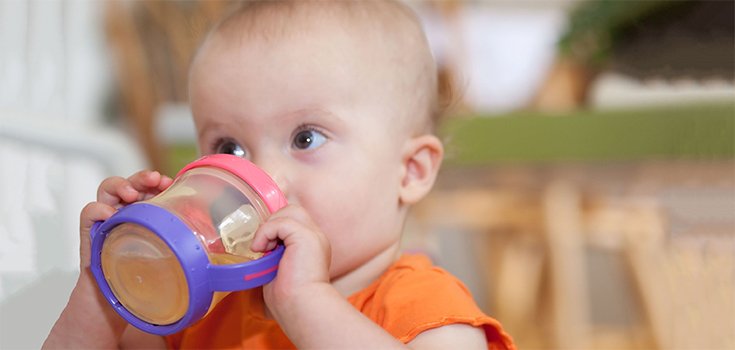Pediatricians Advise Parents: No Fruit Juice for Kids Under 1

The American Academy of Pediatrics (AAP) is recommending that fruit juice should not be given to children under 1 year old. [1]
The new guidance replaces the group’s previous recommendation of no fruit juice for children under 6 months. The AAP has also recommended limits in the past for older infants and children.
One of the reasons for the change is that fruit juice offers no nutritional benefit for very young children, the organization said in a statement published in the journal Pediatrics.
The AAP says it’s still acceptable to give small amounts of fruit juice to older children. Still, if given the option, parents should give their kids whole fruit, which has less sugar and more fiber, instead. Dr. Steven Abrams, co-author of the new report and chair of pediatrics at the University of Texas at Austin, said likewise, consuming too much fruit juice can cause weight gain and tooth decay.
Read: Fruit & Veggie Consumption While Young Reduces Cancer Risk Later
“The problem is, parents will stick a bottle or sippy cup in the kid’s mouth and kind of leave it there all day. That’s not good from the calorie-intake perspective, and it’s sure not good for the teeth. What happens is, the kid then gets used to all the sugar, and then they won’t drink water.” [2]
Dr. Melvin B. Heyman, co-author of the new guidelines and director of the Pediatric Inflammatory Bowel Disease Program at the University of California, San Francisco, said:
“Parents may perceive fruit juice as healthy, but it is not a good substitute for fresh fruit and just packs in more sugar and calories. Small amounts in moderation are fine for older kids, but are absolutely unnecessary for children under 1.” [1]
Actually, fruit juice isn’t necessary for any children, the academy pointed out.

Additional Recommendations
- Toddlers between 1 and 3 years old should consume no more than 4 ounces of fruit juice per day. Juice should be served in a cup, not a bottle or box, as they make it easier to drink juice all day, AAP’s recommendations state. [2]
- Parents should restrict fruit juice to 4-6 oz. for children between 4 and 6.
- Children between 7 and 18 should have no more than 1 cup of juice a day, which accounts for 1 of the recommended daily 2-2.5 cups of fruit.
- The academy discourages unpasteurized juice products, and says grapefruit juice should not be given to children taking ibuprofen, flurbiprofen, warfarin, phenytoin, fluvastatin and amitriptyline, because they it interferes with the medications’ effects. [2]
- The organization says fruit juice is not an appropriate treatment for dehydration or diarrhea.
Sharon Zarabi, a nutritionist at Lenox Hill Hospital in New York City who did not participate in the recommendations, noted that many people incorrectly think that fruit juice is rich in vitamins.
“When you isolate fruit into a liquid form, you’re mostly getting sugar water, and it’s easy to consume excess calories in liquid form, and those calories can add up, and they’re void of any protein or fiber, which is usually what helps keep people satiated.”
Read: “Healthful” Fruit Juice may Have More Sugar than Soda
Another common mistake that people make is believing that fruit drinks and fruit juice percentage are one in the same. The truth is, fruit drinks don’t contain 100% juice, and are flavored with added sugars. They fall into the category of sugar-sweetened beverages, right beside soda, energy drinks and sports drinks, some smoothies, and coffee drinks. [3]
Regular consumption of sugar-sweetened beverages is associated with obesity, Type 2 diabetes, heart disease, and other poor health outcomes.
Sources:
[1] Live Science
[2] CNN
[3] NPR
